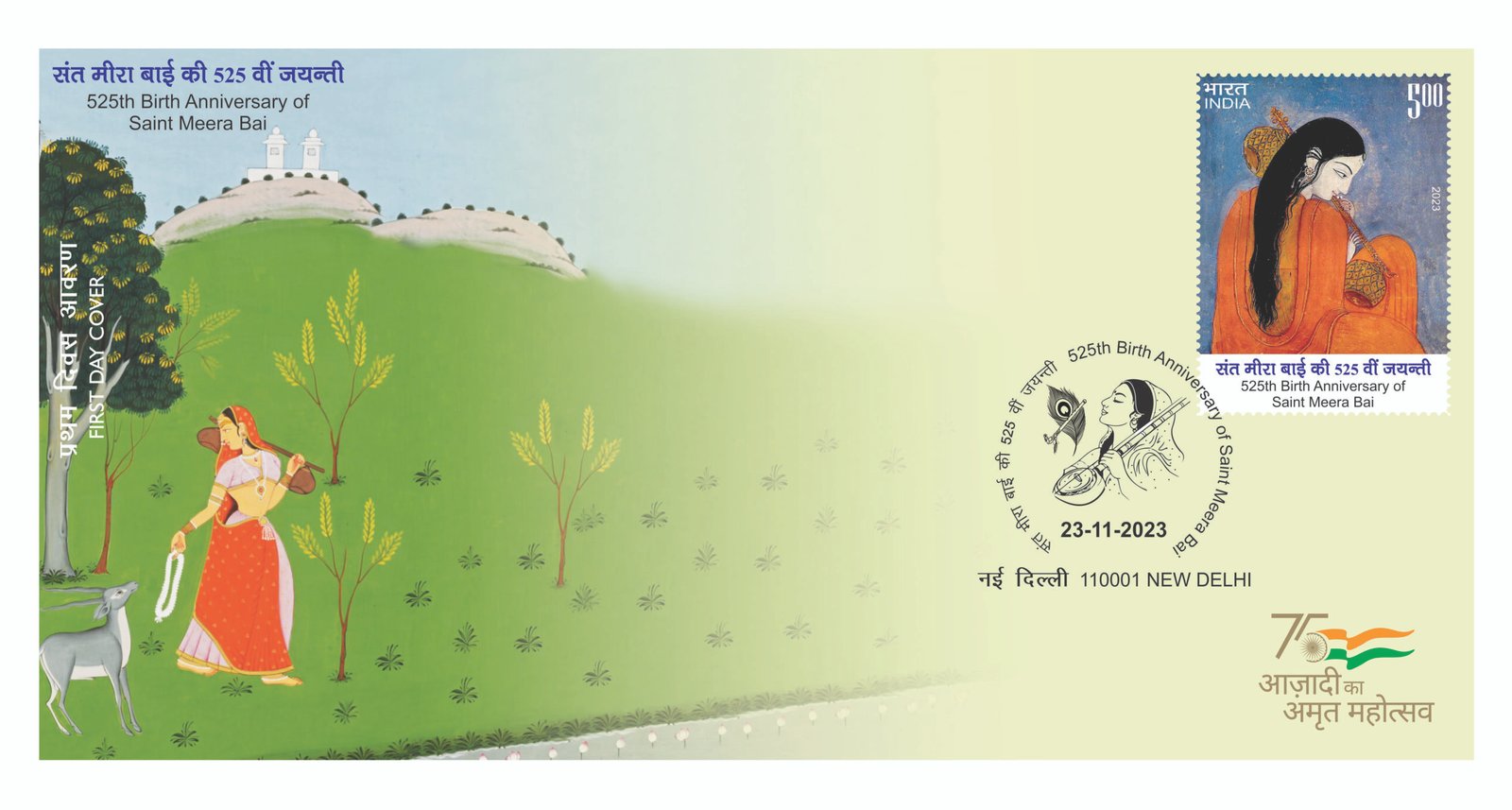525th Birth Anniversary of Saint Meera Bai

Technical Data
| Date of Issue | November 23, 2023 |
|---|---|
| Denomination | Rs. 5 |
| Quantity | 201,600 |
| Perforation | 13½ |
| Printer | Security Printing Press, Hyderabad |
| Printing Process | Wet Offset |
| Watermark | No Watermark |
| Colors | Multicolor |
| Credit (Designed By) | Sh. Brahm Prakash |
| Catalog Codes |
Colnect codes IN 2023.11.23-01 Yvert et Tellier IN 3601 Michel IN 3948 Stanley Gibbons IN 3876 |
| Themes | Famous people | Literary People (Poets and Writers) | Literature | Saints | Women |
Early Life and Spiritual Awakening
Meera Bai, born in 1498 at Kudaki (Rajasthan), was a Hindu mystic, poet, and one of the most prominent figures of the Bhakti Movement. A Rajput princess, she was the only child of Ratan Singh, younger brother of the ruler of Merta. From an early age, her life was marked by deep devotion to Lord Krishna. A holy man gifted her an idol of Krishna during her childhood, which became the focus of her spiritual journey.
A Royal Life and Inner Rebellion
In 1516, Meera Bai was married to Bhoj Raj, crown prince of Mewar. His untimely death in 1521 left her widowed, and soon she faced persecution from her in-laws, especially from her brother-in-law, Vikram Singh. As a widow and a mystic, her life did not fit the traditional expectations of Rajput royalty. Choosing devotion over convention, she spent much of her time in her private Krishna temple, welcoming saints, sadhus, and pilgrims, and composing songs of divine love.
Trials, Persecution, and Miracles
Meera Bai’s devotion often invited hostility. Her poems allude to attempts on her life—once through a basket carrying a poisonous snake, which miraculously transformed into an idol of Krishna, and another time through a cup of poison, which she drank unharmed. These incidents reinforced her image as a soul divinely protected by her Lord.
Pilgrimage and Final Years
Unable to conform to courtly expectations in either Mewar or Merta, Meera Bai embarked on a pilgrimage across India, eventually settling in Dwarka, the city of Krishna. In 1546, when Udai Singh, the new ruler of Mewar, sent emissaries to bring her back, she is said to have entered the temple of Ranchorji (Krishna) and disappeared. According to legend, she merged with the idol of Krishna, symbolizing her ultimate union with her Divine Lover.
Poetry and the Bhakti Tradition
Meera Bai’s verses belong to the rich tradition of Bhakti poetry in medieval India, expressing love for God in simple, relatable imagery like a mother’s affection for a child, a friend’s loyalty, or a woman’s love for her beloved. Her songs, written in everyday language, touched the hearts of common people and became part of India’s spiritual and cultural heritage.
Eternal Influence of Meera’s Songs
The mystic songs of Meera continue to soothe weary hearts and inspire seekers. Their sweetness, simplicity, and emotional depth have the power to move even skeptics. Her verses instill faith, courage, and devotion, encouraging aspirants to embrace the path of love and surrender to God.
Commemorative Tribute
On the occasion of her 525th Birth Anniversary, the Department of Posts is proud to issue a Commemorative Postage Stamp in honour of Saint Meera Bai. This stamp celebrates her enduring legacy as a spiritual icon whose life and songs continue to guide humanity on the path of devotion, courage, and divine love.
First Day Cover

